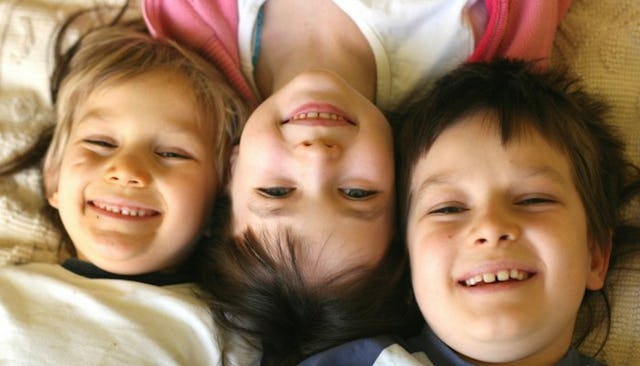'Middle Child Syndrome' Is A Bullsh*t Theory

When my husband and I began to tell friends and family that we are expecting our third child, we were pretty sure that the number one response would be something along the lines of “Did you mean to?” I mean, to be fair, we’re basically elderly in maternity terms.
But instead, we were surprised by the number of comments about how our youngest would become a middle child and how sorry people feel for his new lot in life. One family member even said, “Ugh, poor kid, hope he gets the attention he deserves.”
Um, excuse the fuck out of me? Let’s get something straight: “Middle child syndrome” is utter bullshit. In fact, in 2015 a massive study conducted by German scientists at the University of Leipzig and Johannes Gutenberg University of Mainz looked at more than 20,000 adults with supposed middle child syndrome and found that “development of personality is less determined by the role within the family of origin than previously thought.” The researchers go on to say that basically, middle child syndrome is pop culture bs.
So where did this pseudoscience come from that parenting magazines and personality quizzes love to use as measuring stick to diagnose kids’ behaviors?
Back during the turn of the 19th century, there was a huge scientific boom in Europe that led to many wonderful inventions like the steam locomotive. The seat of this revolutionary time was Vienna, Austria, where our favorite psychoanalyst, Sigmund Freud, busied himself with theories about how women are basically crazy and we can all blame our mothers for everything that is wrong with us. One of Freud’s contemporaries, Alfred Adler, came up with this whiz-bang theory that birth order influences personality traits. And that is where the idea of Middle Child Syndrome was born. Science has come a long way, but our collective assumptions about the behaviors of mothers and children have not in large part thanks to sexist dudes like Freud and Adler.
According to this bogus theory, firstborn children are the natural-born leaders with ingrained skills for things like reliability and problem-solving. The second-born child, who is usually the middle child, are the natural-born whiners who feel left out and grow up to be people-pleasers. The third or youngest child is the baby of the family who can get away with damn near anything and grow up to be self-centered, manipulative attention-seekers.
The shaky logic behind birth order theory influencing personality traits has been debunked countless times, but pop culture has a love affair with it and so this stupid “theory” just won’t die. Much like horoscopes, BuzzFeed quizzes, and the famed Myers-Briggs test, the science behind birth order just does not stand up and yet people point to the general nature of them and exclaim, “OMG, this is me!”
My middle child will be fine. In fact, I’m very sure that he will be more than fine; he’ll get to experience the marvelous benefits of having an older brother, who, by the way, is no goddamn snowflake, as Adler would have you believe according to birth order theory.
In our house, we have rules about respect and accountability. If anyone in my family is feeling left out, then that be news to me since I give a ton of attention to each of my kids. We place a high value on communicating our feelings because we genuinely care about our kids growing up to be well-rounded, decent individuals.
Kids need to be seen, heard, listened to, and respected by their parents. When we can give them that much through modeling healthy behaviors, then kids can figure out how to treat not only their siblings and peers well, but also to create a roadmap of what self-respect and self-empowerment look like to ensure that they will continue to be treated well throughout their adulthoods.
There is no room for some bullshit theory of middle child syndrome in this equation because we don’t value our children by their birth order — we value them as individuals each worthy of our time and love. So the next time someone makes an ill-informed comment about how awful this new child will be for my second-born, I’ll kindly tell them how very wrong they are. My second-born child will continue to be loved and cherished, thank you very much.